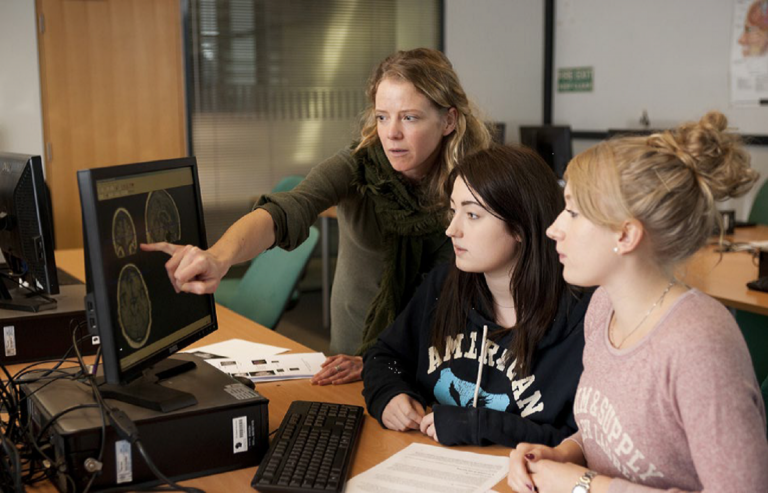
In today’s competitive employment market, students are doing all they can to increase their chances of securing that dream job. From acing their exams to pursuing internship placements, students work hard to build up their portfolio and ensure they stand out from their peers. While all this is highly commendable, these days it can take a lot more to get that foot wedged firmly in the door – but this is where a postgraduate education can certainly help…
According to the Higher Education Authority, 78 percent of Masters and PhD students find meaningful employment shortly after graduating, compared to 76 percent of postgraduate diploma students and just 58 percent of undergraduates, highlighting the sheer extent of benefits this type of education can bring. A postgraduate qualification not only allows students to specialise, but also provides them with additional training and expertise that can significantly boost their chances of securing a graduate job.
One university that appreciates the benefits attached to the pursuit of a postgraduate education is the University of Lincoln, an advocate and first-class provider of postgraduate-level teaching, allowing students to prove their dedication as their career prospects are considerably bolstered.

Image courtesy of the University of Lincoln
In Lincoln’s School of Psychology, courses offer graduates a great route into postgraduate research work at PhD level or to pursue professional training in the Forensic Psychology field. Students also have the chance to study in a research-rich environment alongside a group of staff with international expertise. Here is a list of Lincoln’s postgraduate taught and research degrees:
Focusing on the social, emotional and cognitive development of children, this degree is designed for those who wish to specialise in the child development field.
Examining case formulation and the applied aspects of forensic psychology. Graduates will work with children or adolescents, violent or sexual offenders and those with forensic mental health concerns.
This course is designed to prepare students for a career which requires a solid understanding of research methods in specific areas of Psychology.
The Trent (Universities of Lincoln and Nottingham) Programme is a multi-agency collaboration between Derbyshire Healthcare Foundation NHS Trust, Lincolnshire Partnership Foundation NHS Trust, Nottinghamshire Healthcare NHS Trust and the Universities of Lincoln and Nottingham.
As an MSc by Research, MPhil or PhD student, you will have the opportunity to conduct independent research into your psychological area of choice, producing an extended thesis under the guidance of two academic supervisors.

Image courtesy of the University of Lincoln
Though each course focuses on a specific area of study, graduates have the chance to develop academic and non-academic skills as a result of these programmes. Catia Correia Caeiro, a PhD student from Portugal, who working on research relating to the expression of emotions in dogs, was pleasantly surprised to learn that the institution placed research skills as just one of the important things to learn. “Since my first year of PhD, I became aware of the varied opportunities for PhD students to get involved in different non-research based roles,” she says.
“This made me get out of my ‘research-only’ shell and I found myself adding a considerable range of skills to my curriculum vitae (CV). From teaching seminars and tutorials to co-supervision of undergraduate and MSc projects…to sitting in staff recruitment panels as a student representative, there are plenty of ways to take on non-research roles and further develop other skills that go way beyond running a research project.”
In addition to providing comprehensive postgraduate courses, the School of Psychology is well known for its fundamental and applied research work that has global impact. “Getting involved in research means that I am contributing something real and relevant to the field alongside already established academics,” says Jade Pickering, an undergraduate student. The School’s current projects are organised into four groups, all honing in on a particular area of study:
Focused on how the motor, behavioural and cognitive processes change through time in children and adults, non-human primates and other animals. The group studies how these processes change in relation to life history variables and during the course of evaluation.
Research focused in applied settings and on clinical or forensic populations, concerned with psychological functioning related to clinical and forensic problems. The research focus is on the development and application of psychological theories and technologies that seek to explain, measure, and influence these processes.
Focusing on a broad range of issues that include visual motion processes, emotion and memory, and the visual processing in dyslexic, autistic and neurological populations. Here, students will investigate the way humans perceive, make sense of, and respond to our natural and social surroundings.
The Identity and Social Relationships Research Group (ISR) undertakes research on diverse aspects of identities in the social, cultural and environmental contexts in which people are embedded.
And with an investment of £19 million for the creation of the new Sarah Swift Building – a new home for the School of Psychology and Health and Social Care – students also benefit from state-of-the-art facilities and technologies offered on-campus. Facilities include teaching labs, and psychophysiology, sleep and baby labs, which come fully-equipped with sleep scoring equipment and devices that allow remote activity monitoring for cognitive neuroscience research.

Image courtesy of the University of Lincoln
As for the Lincoln Babylab facility, it contains equipment for preferential looking, eye-tracking, and act-out and habituation research in babies and young children. And to ensure the School continues to make strides within the research world, the institution has invested in a 3D digital whole body scanner, the only one of its kind outside of a specialist clinical facility in the UK, focusing on research into complex matters like body image perception and eating disorders.
What makes the Lincoln study experience so unique is the hands-on approach this institution takes. Here, you’ll not only discover, but also learn and share knowledge as you collaborate with fellow students and academics.
Follow the University of Lincoln on Facebook, Twitter, Instagram, YouTube and Google+







